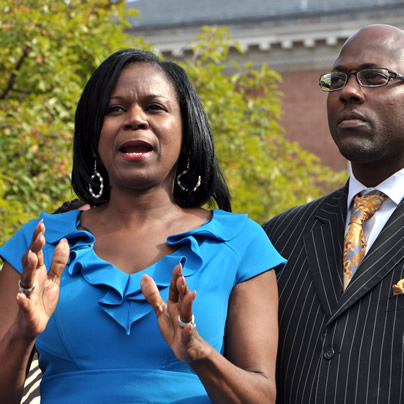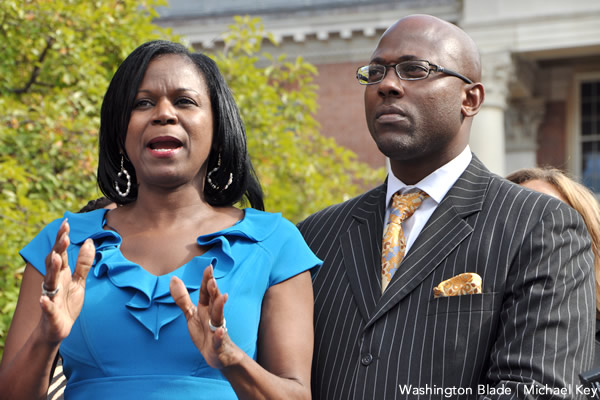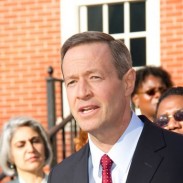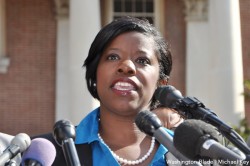Local
Gallaudet official blasts school, hints at lawsuit
Lesbian faculty members named as ‘instigators’ for placing McCaskill on leave


Gallaudet University chief diversity officer Angela McCaskill this week denounced a decision by the school to put her on leave after she signed an anti-gay petition in Maryland. (Washington Blade photo by Michael Key)
ANNAPOLIS, Md. — Gallaudet University’s chief diversity officer said her reputation was unfairly “tarnished” last week when the university placed her on paid administrative leave for signing a petition in July to place Maryland’s same-sex marriage law on the ballot in a voter referendum.
At a news conference outside the Maryland State Capitol Building in Annapolis, Angela McCaskill, who served as Gallaudet’s Associate Provost of Diversity and Inclusion, identified two out lesbian faculty members as the ones she claims persuaded Gallaudet President T. Alan Hurwitz to suspend her from her job.
She identified the faculty members as Martina “MJ” Bienvenu and Kendra Smith, saying the two are partners and wrote a joint letter to Hurwitz asking that she be reprimanded.
The Blade sent e-mails to Bienvenu and Smith seeking their version of what role they may have played in McCaskill’s suspension. The two responded late Wednesday with a one-sentence statement released by Gallaudet spokesperson Catherine Murphy.
“At this time, we would prefer this matter be a discussion between the University and Dr. Angela McCaskill,” the statement says.
“I was shocked, hurt, insulted. I was humiliated,” McCaskill said, adding that Hurwitz sought to punish her for merely exercising her private right as a Maryland resident to sign a petition to allow voters to make the final decision on whether the same-sex marriage law should be retained or overturned.
“They have attempted to intimidate me and tarnish my reputation,” she said.
McCaskill, speaking in sign language, delivered her comments through an interpreter.
She declined to disclose her position on same-sex marriage or whether she will vote for or against the marriage equality law in the Nov. 6 referendum.
McCaskill’s news conference came hours after the university released a statement saying it wants to talk to McCaskill about reaching an agreement that could lead to her reinstatement.
Her attorney, J. Wyndal Gordon, told the news conference McCaskill suffered damages by the university’s action and she would seek compensation for the damages. He declined to say whether McCaskill planned to file a lawsuit and seek monetary compensation.
“We will gladly meet with them,” he said of the university offer to discuss ways to reinstate McCaskill.
Gordon stated repeatedly that McCaskill remains neutral on the gay marriage ballot referendum. He said her decision to sign the petition to place the marriage question on the ballot was based on her strong belief that all controversial issues should be put before voters in Maryland.
“I fully support the members of the LGBT community as I support all groups across Gallaudet and its community,” McCaskill told the news conference.
“When I assumed my position we had an LGBTQA Resource Center that had been formed without funding,” she said. “It was simply an office. I relocated resources to provide support for the center because I believe that members of the LGBTQA community deserve more.”
McCaskill, 54, said she has worked at Gallaudet for 24 years. Her biography on the university website says she is the first deaf African-American woman to earn a Ph.D. from Gallaudet.
Tuesday’s news conference marked the first time McCaskill has spoken publicly about her suspension since the university community first learned about it on Oct. 10 through a statement released by Hurwitz.
“It recently came to my attention that Dr. McCaskill has participated in a legislative initiative that some feel is inappropriate for an individual serving as Chief Diversity Officer; however, other individuals feel differently,” Hurwitz said.
“I will use the extended time while she is on administrative leave to determine the appropriate next steps taking into consideration the duties of this position at the university,” he said. “In the meantime an interim Chief Diversity Officer will be announced in the near future.”

Maryland Gov. Martin O’Malley has called for the reinstatement of Gallaudet University official Angela McCaskill. (Washington Blade file photo by Pete Exis)
Since making that announcement, Hurwitz has come under fire from both supporters and opponents of the Maryland marriage equality law. Maryland Gov. Martin O’Malley, a strong supporter of the same-sex marriage law, and Josh Levin, chair of Marylanders for Marriage Equality, the lead group campaigning to retain the same-sex marriage law, have called on Gallaudet to immediately reinstate McCaskill.
The anti-gay Family Research Council and the Maryland Marriage Alliance, two groups urging voters to overturn the marriage equality law in the November referendum, have cited McCaskill’s suspension as a predictor of what will happen if the law is upheld and takes effect in January.
“Homosexual activists continue to cry that individual and religious liberties are not at risk,” said Maryland Marriage Alliance Chair Derek McCoy in a statement released on Tuesday. “The suspension of Dr. McCaskill is proof of the disingenuous and untruthful nature of that argument.”
In a full-page ad published Tuesday in the Annapolis daily newspaper The Capital, Marylanders for Marriage Equality disputed McCoy’s assertion.
“Unfortunately, opponents of marriage equality are trying to make what happened to Dr. McCaskill about Question 6, the November ballot measure that will allow gay and lesbian couples to get a civil marriage license and protects religious freedom,” the ad states.
“But her suspension from a D.C. university has nothing to do with Question 6 in Maryland,” the ad says. “It does however have everything to do with being able to express one’s opinions, freely, and participate in the political process…Question 6 is about fairness and equality under the law, and it’s only fair Dr. McCaskill get her job back.”
McCaskill’s decision to sign the referendum petition was first reported by the blog Planet DeafQueer, which is widely read nationally in the LGBT deaf community.
The blog reported that an unidentified faculty member reportedly found McCaskill’s name on a database list of all signers of the petition that was released by the Maryland board of elections and published by the Washington Blade.
At Tuesday’s news conference in Annapolis, neither McCaskill nor Gordon, her attorney, identified Bienvenu or Smith as the faculty members who discovered McCaskill’s name on the database of petition signers.
But McCaskill told of how the two faculty members played a key role in what she described as a “tremendously horrific” two-week period in which her 24-year career at the university was shaken.
“This nightmare began two weeks ago on Wednesday, Oct. 3, when I was approached by a faculty member of Gallaudet University whose name is Martina Bienvenu,” McCaskill said.

Maryland State Rep. Aisha Braveboy also spoke at the press conference. (Washington Blade photo by Michael Key)
“She asked if I had signed a petition to put the question of same-sex marriage on the ballot as a referendum,” McCaskill continued. “I responded that I had, that I did sign such a petition. In this very moment, she determined that the signature meant that I was anti-gay. No one has the right to decide what my signature meant,” she said. “Only I can do that.”
Added McCaskill, “MJ, Dr. Bienvenu and her partner, Kendra Smith, wrote a letter to the president of the university asking that I be reprimanded.”
Their biographies posted on the Gallaudet website state that both hold a Ph.D., with Bienvenu serving as a professor of “ASL and Deaf Studies” and Smith serving as an assistant professor of counseling. Both have been involved in academic-related projects involving LGBT deaf people, according to the biographies.
Planet DeafQueer reported in an Oct. 8 posting that LGBT students, who considered McCaskill a friend and ally in her role as chief diversity officer, were shocked when they learned she had signed a petition to place the marriage equality law on the ballot in a referendum.
The blog posting said LGBT students and faculty believed it was inappropriate for the school’s diversity officer to take such an action, which they viewed as an endorsement of the campaign to defeat the marriage equality law.
LGBT activists in Maryland have pointed out that the signature gathering effort to place the marriage equality law on the ballot was organized and carried out by people who oppose same-sex marriage.
But Gordon, McCaskill’s attorney, said at the news conference Tuesday that it would be incorrect to label McCaskill as being anti-gay or an opponent of gay marriage.
“Her signature on the same-sex marriage petition referendum that she signed in July 2012 merely represented her desire to, one, have this matter decided through the Maryland democratic process; two, allow Maryland citizens to become more informed on the issue through public discourse; and three, to enable Maryland citizens to cast their votes after thoroughly examining the issues and making an informed decision,” he said.
“Signing a petition to have same-sex marriage placed on the November ballot in Maryland’s general election no more interferes or compromises Dr. McCaskill’s integrity or qualifications as the Chief Diversity Officer than it would if she signed a petition to place affirmative action or any other controversial issue on the November ballot.”
Greg Nevins, an attorney with the gay litigation group Lambda Legal Defense and Education Fund, said an employer such as a university could establish restrictions on an employee’s public actions under certain circumstances.
“I would say people can vote the way they want to,” Nevins said. “But as far as putting yourself out in a public way, if it’s contrary to your job description – the things that you should be portraying and the employer’s position – they can take action against you.”
District of Columbia
D.C. police arrest man for burglary at gay bar Spark Social House
Suspect ID’d from images captured by Spark Social House security cameras

D.C. police on Feb. 18 arrested a 63-year-old man “of no fixed address” for allegedly stealing cash from the registers at the gay bar Spark Social House after unlawfully entering the bar at 2009 14th St., N.W., around 12:04 a.m. after it had closed for business, according to a police incident report.
“Later that day officers canvassing for the suspect located him nearby,” a separate police statement says. “63-year-old Tony Jones of no fixed address was arrested and charged with Burglary II,” the statement says.
The police incident report states that the bar’s owner, Nick Tsusaki, told police investigators that the bar’s security cameras captured the image of a man who has frequently visited the bar and was believed to be homeless.
“Once inside, the defendant was observed via the establishment’s security cameras opening the cash register, removing U.S. currency, and placing the currency into the left front pocket of his jacket,” the report says.
Tsusaki told the Washington Blade that he and Spark’s employees have allowed Jones to enter the bar many times since it opened last year to use the bathroom in a gesture of compassion knowing he was homeless. Tsusaki said he is not aware of Jones ever having purchased anything during his visits.
According to Tsusaki, Spark closed for business at around 10:30 p.m. on the night of the incident at which time an employee did not properly lock the front entrance door. He said no employees or customers were present when the security cameras show Jones entering Spark through the front door around 12:04 a.m.
Tsusaki said the security camera images show Jones had been inside Spark for about three hours on the night of the burglary and show him taking cash out of two cash registers. He took a total of $300, Tsusaki said.
When Tsusaki and Spark employees arrived at the bar later in the day and discovered the cash was missing from the registers they immediately called police, Tsusaki told the Blade. Knowing that Jones often hung out along the 2000 block of 14th Street where Spark is located, Tsusaki said he went outside to look for him and saw him across the street and pointed Jones out to police, who then placed him under arrest.
A police arrest affidavit filed in court states that at the time they arrested him police found the stolen cash inside the pocket of the jacket Jones was wearing. It says after taking him into police custody officers found a powdered substance in a Ziploc bag also in Jones’s possession that tested positive for cocaine, resulting in him being charged with cocaine possession in addition to the burglary charge.
D.C. Superior Court records show a judge ordered Jones held in preventive detention at a Feb. 19 presentment hearing. The judge then scheduled a preliminary hearing for the case on Feb. 20, the outcome of which couldn’t immediately be obtained.
District of Columbia
Judge rescinds order against activist in Capital Pride lawsuit
Darren Pasha accused of stalking organization staff, board members, volunteers

A D.C. Superior Court judge on Feb.18 agreed to rescind his earlier ruling declaring local gay activist Darren Pasha in default for failing to attend a virtual court hearing regarding an anti-stalking lawsuit brought against him by the Capital Pride Alliance, the group that organizes D.C.’s annual Pride events.
The Capital Pride lawsuit, initially filed on Oct. 27, 2025, accuses Pasha of engaging in a year-long “course of conduct” of “harassment, intimidation, threats, manipulation, and coercive behavior” targeting Capital Pride staff, board members, and volunteers.
In his own court filings without retaining an attorney, Pasha has strongly denied the stalking related allegations against him, saying “no credible or admissible evidence has been provided” to show he engaged in any wrongdoing.
Judge Robert D. Okum nevertheless on Feb. 6 approved a temporary stay-away order requiring Pasha to stay at least 100 feet away from Capital Pride’s staff, volunteers, and board members until the time of a follow-up court hearing scheduled for April 17. He reduced the stay-away distance from 200 yards as requested by Capital Pride.
In his two-page order issued on Feb. 18, Okun stated that Pasha explained that he was involved in a scooter accident in which he was injured and his phone was damaged, preventing him from joining the Feb. 6 court hearing.
“Therefore, the court finds there is a good cause for vacating the default,” Okun states in his order.
At the time he initially approved the default order at the Feb. 6 hearing that Pasha didn’t attend, Okun scheduled an April 17 ex parte proof hearing in which Capital Pride could have requested a ruling in its favor seeking a permanent anti-stalking order against Pasha.
In his Feb. 18 ruling rescinding the default order Okun changed the April 17 ex parte proof hearing to an initial scheduling conference hearing in which a decision on the outcome of the case is not likely to happen.
In addition, he agreed to consider Pasha’s call for a jury trial and gave Capital Pride 14 days to contest that request. The Capital Pride lawsuit initially called for a non-jury trial by judge.
One request by Pasha that Okum denied was a call for him to order Capital Pride to stop its staff or volunteers from posting information about the lawsuit on social media. Pasha has said the D.C.-based online blog called DC Homos, which Pasha claims is operated by someone associated with Capital Pride, has been posting articles portraying him in a negative light and subjecting him to highly negative publicity.
“The defendant has not set forth a sufficient basis for the court to restrict the plaintiff’s social media postings, and the court therefore will deny the defendant’s request in his social media praecipe,” Okun states in his order.
A praecipe is a formal written document requesting action by a court.
Pasha called the order a positive development in his favor. He said he plans to file another motion with more information about what he calls the unfair and defamatory reports about him related to the lawsuit by DC Homos, with a call for the judge to reverse his decision not to order Capital Pride to stop social media postings about the lawsuit.
Pasha points to a video interview on the LGBTQ Team Rayceen broadcast, a link to which he sent to the Washington Blade, in which DC Homos operator Jose Romero acknowledged his association with Capital Pride Alliance.
Capital Pride Executive Director Ryan Bos didn’t immediately respond to a message from the Blade asking whether Romero was a volunteer or employee with Capital Pride.
Pasha also said he believes the latest order has the effect of rescinding the temporary stay away order against him approved by Okun in his earlier ruling, even though Okun makes no mention of the stay away order in his latest ruling. Capital Pride attorney Nick Harrison told the Blade the stay away order “remains in full force and effect.”
Harrison said Capital Pride has no further comment on the lawsuit.
District of Columbia
Trans activists arrested outside HHS headquarters in D.C.
Protesters demonstrated directive against gender-affirming care

Authorities on Tuesday arrested 24 activists outside the U.S. Department of Health and Human Services headquarters in D.C.
The Gender Liberation Movement, a national organization that uses direct action, media engagement, and policy advocacy to defend bodily autonomy and self-determination, organized the protest in which more than 50 activists participated. Organizers said the action was a response to changes in federal policy mandated by Executive Order 14187, titled “Protecting Children from Chemical and Surgical Mutilation.”
The order directs federal agencies and programs to work toward “significantly limiting youth access to gender-affirming care nationwide,” according to KFF, a nonpartisan, nonprofit organization that provides independent, fact-based information on national health issues. The executive order also includes claims about gender-affirming care and transgender youth that critics have described as misinformation.
Members of ACT UP NY and ACT UP Pittsburgh also participated in the demonstration, which took place on the final day of the public comment period for proposed federal rules that would restrict access to gender-affirming care.
Demonstrators blocked the building’s main entrance, holding a banner reading “HANDS OFF OUR ‘MONES,” while chanting, “HHS—RFK—TRANS YOUTH ARE NO DEBATE” and “NO HATE—NO FEAR—TRANS YOUTH ARE WELCOME HERE.”
“We want trans youth and their loving families to know that we see them, we cherish them, and we won’t let these attacks go on without a fight,” said GLM co-founder Raquel Willis. “We also want all Americans to understand that Trump, RFK, and their HHS won’t stop at trying to block care for trans youth — they’re coming for trans adults, for those who need treatment from insulin to SSRIs, and all those already failed by a broken health insurance system.”
“It is shameful and intentional that this administration is pitting communities against one another by weaponizing Medicaid funding to strip care from trans youth. This has nothing to do with protecting health and everything to do with political distraction,” added GLM co-founder Eliel Cruz. “They are targeting young people to deflect from their failure to deliver for working families across the country. Instead of restricting care, we should be expanding it. Healthcare is a human right, and it must be accessible to every person — without cost or exception.”

Despite HHS’s efforts to restrict gender-affirming care for trans youth, major medical associations — including the American Medical Association, the American Academy of Pediatrics, and the Endocrine Society — continue to regard such care as evidence-based treatment. Gender-affirming care can include psychotherapy, social support, and, when clinically appropriate, puberty blockers and hormone therapy.
The protest comes amid broader shifts in access to care nationwide.
NYU Langone Health recently announced it will stop providing transition-related medical care to minors and will no longer accept new patients into its Transgender Youth Health Program following President Donald Trump’s January 2025 executive order targeting trans healthcare.



















